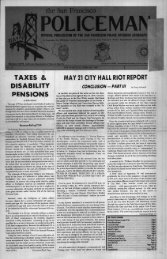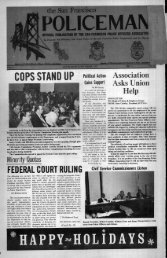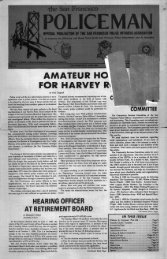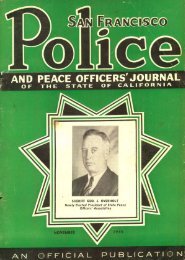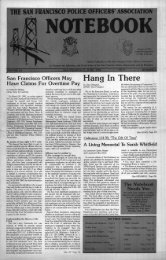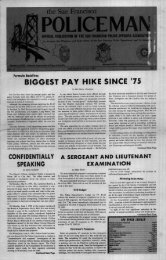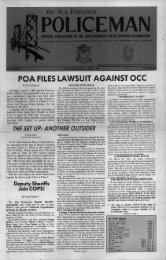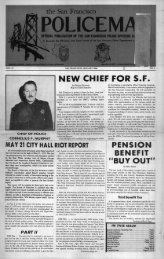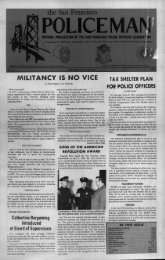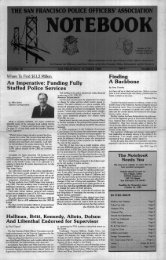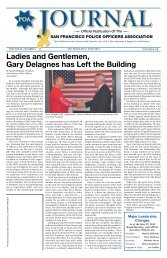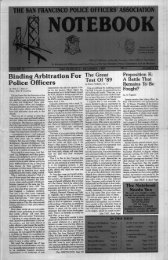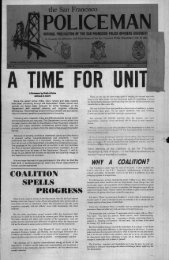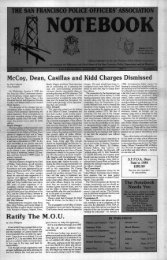(415) 822-1000 HOME (415) - San Francisco Police Officers ...
(415) 822-1000 HOME (415) - San Francisco Police Officers ...
(415) 822-1000 HOME (415) - San Francisco Police Officers ...
You also want an ePaper? Increase the reach of your titles
YUMPU automatically turns print PDFs into web optimized ePapers that Google loves.
Page 28 SAN FRANCISCO POLICEMAN December 1982<br />
DISABILITY PENSIONS<br />
continued from page 1<br />
criteria set forth in Section 104 of the Internal Revenue<br />
Code and is therefore taxable, unless the same polic<br />
officer had received a disability rating from the<br />
Workers' Compensation Appeals Board establishinf<br />
his disability at or above the figure of 55%.<br />
Using the same 35 year old police officer bul<br />
substituting a disability rating of 65% (established b3<br />
the Workers' Compensation Appeals Board after th<br />
industrial disability retirement was awarded by thc<br />
Retirement Board) due to a severe occupational injury,<br />
his or her allowance is fully excludable and his or hei<br />
entire service retirement would also be excludable sinc<br />
the disability rating (65%) is more than the percentag<br />
he will receive as a service retirement (55%).<br />
In 1969 and prior years, a member automaticall3<br />
received 75% of salary when awarded an industria<br />
disability retirement. When that person becomes eligi<br />
ble for a service retirement (having obtained the agc<br />
and years in service), no part of his retirement is tax<br />
able since the 75% would exceed whatever servic<br />
retiremen the may had been eligible to receive (50<br />
70%).<br />
DISABILITY RATING<br />
It appears now that more attention will have to be<br />
given to obtaining a rating from the Workers' Compensation<br />
Appeals Board after the industrial disability<br />
retirement has been awarded by the Retirement Board.<br />
(It should be noted at this point that police officers and<br />
firefighters who are under Tier II Retirement System -<br />
POST 1976 - are not entitled to a disability rating<br />
since their disability is statutorily set at 50%). That<br />
rating, if it falls below 50%, has no affect whatsoever<br />
on the retirement since the minimum retirement is<br />
50%. However, an award above 50% has now become<br />
important for a second reason (the first being the additional<br />
monthly monies received); the rating is now<br />
necessary in order to protect the non-taxability of these<br />
retirement monies once the police officer or firefighter<br />
reaches normal retirement age.<br />
The procedure for obtaining such a rating is as<br />
follows: an application for adjudication of claim is filed<br />
with the Workers' Compensation Appeals Board and<br />
the matter is calendared for a rating conference. An informal<br />
rating based on medical reports in evidence is<br />
then obtained from the Disability Rating Bureau; the<br />
rating best obtained is presented to the judge for purposes<br />
of having the rating fixed in an award of fixed by<br />
stipulaton of the attorneys involved.<br />
1982 TAX RETURN<br />
The completion of the U.S. Individual Income Tax<br />
Return for 1982 requires that pensions and annuities be<br />
reported on the front sheet of form 1040 at lines 16 and<br />
17. The computation for completing lines 16 and 17 is<br />
found on a worksheet provided at page 10 of the U.S.<br />
Income Tax Forms and Instruction package which is<br />
sent to all taxpayers. Line 16 is for the reporting of fully<br />
taxable pensions and annuities. On line 16, for example,<br />
all service pension monies, remaining after all exclusions<br />
have been made to the Retirement System for<br />
monies which the member had already contributed to<br />
the Retirement System, are reported.<br />
Lines 17 (a) and 17 (b), along with the worksheet on<br />
page 10, are for the reporting of industrial disability<br />
retirement pensions. Only the taxable amount, if any<br />
and computed in accordance with the worksheet on<br />
page 10 of the instructions, should be reported at line<br />
17(b).<br />
It should be kept in mind that the Retirement System<br />
in January of each year forwards to each member<br />
receiving an industrial disability retirement a form W-<br />
2P indicating the amounts of money which the Retirement<br />
System has paid to the member in the prior year.<br />
Please take note that a copy of this form is also sent to<br />
the Internal Revenue Service Center in Fresno and can<br />
be matched with monies which should be reported on<br />
lines 17 (a). A police officer or firefighter who has<br />
received an industrial disability retirement and does not<br />
report such amount on line 17 (a) on form 1040, runs a<br />
significant risk of an audit and an embarrassing situation<br />
in attempting to explain why significant monies<br />
were not accounted for on the 1040 return.<br />
For the police officer or firefighter who received the<br />
industrial disability retirement after being eligible for a<br />
service retirement or who received it before being eligible<br />
but who becomes eligble for a service retirement,<br />
the reporting can be complicated. It requires consideration<br />
of the facts that (1) The total amount previously<br />
paid into the system by the police officer or firefighter<br />
will not be returned within 3 years and therefore may be<br />
excluded; (2) The permanent disability award fixing a<br />
rating and (3) The percentage by which the service<br />
retirement exceeds the industrial disability retirement.<br />
All three (3) factors are used to determine the taxable<br />
amount of an industrial disability retirement.<br />
AUDIT OF PRIOR YEARS<br />
In my experience in working on these matters, I have<br />
found that approximately 20-25% of the amount<br />
received pursuant to an industrial disability retirement,<br />
A POLICEMAN'S LOT/Tom Flippin<br />
after reaching the age of service retirement, is taxable<br />
and the remaining amount is excludable from gross income.<br />
Members wishing advice on this are urged to contact<br />
the welfare officer on an individual basis in that this<br />
matter is complex and not readily given to addressing<br />
outside of a specific context. The general rule however<br />
remains that Section 104 (a)(1) does not apply to a<br />
retirement pension to the extent that it is determined by<br />
reference to an employee's age or length of service even<br />
though the employee's retirement is occasioned by an<br />
occupational injury or sickness.<br />
NEW TAX WITHHOLDING LAWS<br />
At present, the <strong>San</strong> <strong>Francisco</strong> Retirement System<br />
does not determine the taxability or non-taxability of<br />
the payments it makes to retired police officers or<br />
firefighters. It simply makes the payments and reports<br />
all payments made on Form W-2P, . a copy of which is<br />
filed with the IRS and another copy given to the retired<br />
person. Through December 31, 1982, a retired police<br />
officer or firefighter receiving a service or disability<br />
pension could elect to have a portion of the benefits<br />
withheld for federal income taxes by the Retirement<br />
System. Beginning on January 1, 1983, the Retirement<br />
System is required to withhold a portion of your<br />
benefits for federal income tax purposes, unless the<br />
Retirement System believes that all or a portion of the<br />
amounts paid are not taxable or unless you direct them<br />
not to make such withholdings. Since the Retirement<br />
System does not distinguish between taxable and nontaxable<br />
payments, it will undoubtedly withhold against<br />
all payments unless a retired officer or firefighter elects<br />
not to have any withholding.<br />
However, the Retirement System has advised me that<br />
it will not be able to comply with the new law until June,<br />
1983. From January 1, 1983, until June of 1983, the<br />
Retirement System will continue to withhold or not<br />
withhold as it did through 1982. The Retirement<br />
System plans to issue a notice regarding the new<br />
withholding procedures to all retired police officers and<br />
firefighters in its bulletin in the near future.<br />
You should consider whether or not federal income<br />
taxes should be withheld from your pension. The usual<br />
objection to withholding is that the government gets the<br />
use of your money well before the tax date of April 15th<br />
and you lose the interest or other income you could have<br />
earned by investing the money. However, some people<br />
will favor the withholding because it will reduce or<br />
eliminate the need to make quarterly estimated tax<br />
payments.<br />
<strong>Police</strong> officers or firefighters who receive taxable service<br />
pensions or partially taxable disability pensions<br />
should weigh the advantages of having tax withheld versus<br />
receiving the funds currently and investing them.<br />
<strong>Police</strong> officers and firefighters who are not subject to<br />
tax on their disability pensions should probably not<br />
have amounts withheld from their pensions. An IRS<br />
agent could improperly view withholding on nontaxable<br />
amounts as an "admission" by the firefighter or<br />
police officer that he or she considered the amounts<br />
received to be taxable.<br />
DISABILITY LEAVE<br />
The Charter of the City and County of <strong>San</strong> <strong>Francisco</strong><br />
provides that occupationally injured police officers and<br />
firefighters are entitled to a leave of absence with full<br />
pay for a period of up to 365 calendared days for any<br />
one injury sustained in the line of duty. An Internal<br />
Revenue Service's memorandum dated July 28, 1978<br />
and the Rulings which were discussed in this article<br />
have nothing to do with the taxabilities of those monies.<br />
Since they are in the nature of a workers' compensation<br />
award, they are and remain fully excludable and not<br />
subject to either Federal or State taxation.<br />
LIGHT DUTY ASSIGNMENT<br />
Revenue Ruling 80-137 discusses the following<br />
issues: Are payments made by a municipality to a<br />
disabled police officer performing light duty excludable<br />
from gross income under Section 104 of the Internal<br />
Revenue Code?<br />
This Revenue Ruling discusses payments made by a<br />
municipality to a disabled police officer who has returned<br />
to work, but is assigned to light duty because the in-<br />
I<br />
I CHIMPS, 9A) O)(,<br />
,qdJ OU€GRO(..J,<br />
UCJu F2Y-7AAP ?-tqo(<br />
IT 7/1/5 r,rie!/<br />
jury keeps the officer from performing regular police<br />
duties. The Internal Revenue Service, in this Ruling<br />
stated that monies received by a police officer assigned<br />
to light duty are payment of regular salary made and<br />
returned for services performed by the police officer<br />
and therefore do not fall under the exclusion from gross<br />
income provided in Section 104 (a)(1). This means that,<br />
unfortunately, monies received by offices performing in<br />
a light duty capacity are fully taxable.<br />
FRANCHISE TAX BOARD<br />
The Franchise Tax Board of the State of California<br />
treats taxabilities of monies received pursuant to an industrial<br />
disability retirement in the same manner as<br />
does the Internal Revenue Service. Revenue and Taxation<br />
Code 17138 is substantially similar to Section 104<br />
of the Internal Revenue Code. Both the Federal government<br />
and the State government are in accord as to the<br />
manner in which industrial disability retirement monies<br />
are to be taxed. Therefore any member receiving an inquiry<br />
from the Franchise Tax Board concerning the<br />
manner in which he reported monies received from an<br />
industrial disability retirement should use the same<br />
procedures contained in this article for reporting<br />
monies on form 1040 to the Internal Revenue Service.<br />
SURVIVING SPOUSE<br />
Payments made to the spouses of firefighters or<br />
police officers who are killed in the line of duty or who,<br />
after retirement (for service or industrial disability) die<br />
as a result of the industrial injuries, are also entitled to<br />
favorable tax treatment for monies received from the<br />
Retirement System.<br />
If the police officer or firefighter was killed in the hne<br />
of duty prior to being eligible for a service retirement,<br />
Revenue Ruling 80-14 holds that benefits paid to the<br />
surviving spouse during the spouse's lifetime are completely<br />
excludable from gross income under Section 104<br />
(a)(1) of the Internal Revenue Code.<br />
The question becomes more complex when the police<br />
officer or firefighter who dies, leaving a surviving<br />
spouse, has already reached eligibility for a service<br />
retirement or has in fact retired for either a service or<br />
industrial disability retirement. Revenue Rulings 72-<br />
291 and 80-84, pertaining to beneficiaries of deceased<br />
firefighters (also applicable to police officers), hold that<br />
benefits received by these beneficiaries are excludable<br />
from gross income under Section 104 (a)(1) of the Code<br />
if the recipient can establish either that (a) The benefits<br />
are received under the service connected death provision<br />
or (b) That the benefits are received under the<br />
retirement provision and that the employee on account<br />
of who's death the benefits are paid was retired under<br />
the service connected disability provision of the Charter<br />
at the time of the employee's death. These holdings appear<br />
to indicate that if there is a determination that the<br />
death was caused by occupational injury or illness, then<br />
payments to their surviving spouse are not subject to<br />
taxation.<br />
However, it should be noted that in my experience<br />
representing beneficiaries of deceased police officers<br />
that the Internal Revenue Service takes a position that<br />
they should be treated in the same manner as their<br />
deceased spouse for tax purposes. This means that if<br />
part of the deceased spouse's retirement monies were<br />
being taxed, the Internal Revenue Service asserts its<br />
right to tax that same percentage when it is received by<br />
the beneficiary.<br />
Zuni<br />
<strong>415</strong>/552-2522<br />
1658 Market Street<br />
<strong>San</strong> <strong>Francisco</strong>, CA



